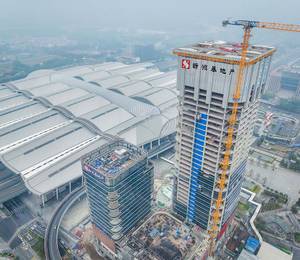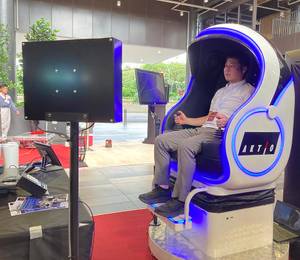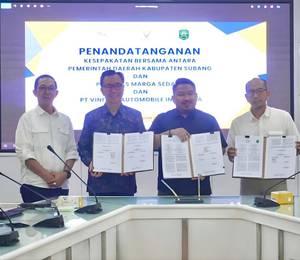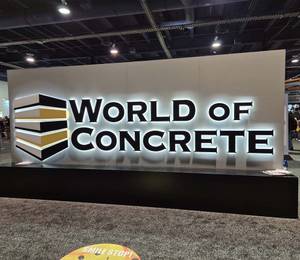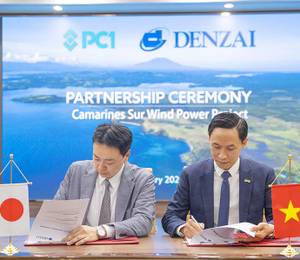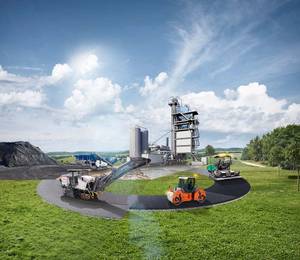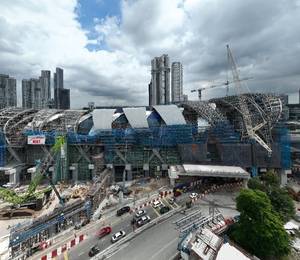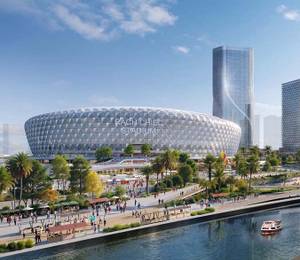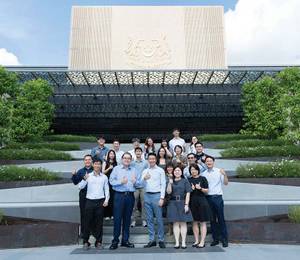A leading player in the asphalt and concrete batching plant sectors, Lintec & Linnhoff has been involved in key infrastructure projects around the world. Southeast Asia Construction (SEAC) talks to Tee Peow Aik, group chief operating officer at Lintec & Linnhoff, about opportunities and challenges in the Asian market, digitalisation and its impact on the group’s operation, and what’s in store for the future.
1). Mr Tee, Lintec & Linnhoff is active globally. Can you tell us more about the group’s presence in Asia, and the challenges faced in this market?
Tee Peow Aik (TPA): Asia is one of our biggest markets and certainly one where we’ve established our strongest presence. Challenges and opportunities vary across the region. We take a granular approach – not only to working with individual countries, but with individual customers in those countries. If you focus a business around its customers, then it directs a lot of what happens on a day-to-day basis.
Given that Lintec & Linnhoff is headquartered in Singapore, there are multiple benefits that help us address challenges across the region. Singapore’s strategic location at the heart of Southeast Asia makes it a global hub for businesses looking to access markets across Asia. In addition, Singapore boasts excellent infrastructure including world-class ports and airports, ensuring efficient logistics and supply chains, coupled with strong government support and a skilled labour force.
Lintec & Linnhoff is backed by our strong German heritage, which dates back over 100 years. It also has a strong presence in Asia since 1986, including manufacturing facilities in Malaysia and China for supply to local and regional markets.
Having said that, within each country, there are specific aspects of business including regulatory or environmental, supply chain or logistics. We rely on our close-knit team and network of well-established dealers to stay ahead of what’s going on. It’s all about staying on top of market changes, building strong partnerships and being flexible.
The outlook for Asia over the medium term is positive. We expect ongoing investment in infrastructure including our newly launched manufacturing plant in Johor, Malaysia, which is near strategically important and cost-efficient shipping lanes. We remain upbeat about Asia’s future and are fully focused on remaining a leading supplier for the region.
2). Speaking of the new factory in Johor, this is a major investment for the group. Can you share the progress so far?
TPA: Phase one covering 88,888 sq ft was launched in December 2022. The plan was to start two additional expansions at the facility to meet our growth ambitions. Phase two, with an extra 76,850 sq ft is in progress and almost 80% complete and we expect this to be done by early 2024. This will enable us to develop and manufacture Lintec containerised asphalt and concrete plants at the facility.
The third phase of expansion work at the facility will begin shortly after that. This will see an increase in the size of the open-yard area for storage and create more space for rigorous testing and assembly of plants before delivery to customers.
We have an exciting, long-term vision for our facility in Johor and additional investment will also be made for new equipment to support production capacity and efficiency. Once complete, there is scope for the planned development of the Johor facility to cover more than 282,000 sq ft.
3). Digitalisation has significantly transformed the way businesses operate. How does it impact Lintec & Linnhoff, particularly in Asia?
TPA: Digitalisation, one of the most exciting areas of growth and development for the construction segment, has been an essential feature of our plants for many years. We use the Microsoft platform for the operating system within our plants, making it a simple ‘plug and play’ step for customers to integrate the plant into their IT infrastructure.
We’ve also had automation in our operations for many years. Of course, the acceleration we’re seeing in other industries will continue to impact the concrete and asphalt segments, including our brands.
Overall, I’d say there are several areas where we expect digitalisation to have a stronger impact on our business and our customers. These are:
• Process optimisation: Digitalisation allows for real-time monitoring and control of plant operations.
• Remote monitoring: It’s possible to monitor, adjust and troubleshoot operations from the office, allowing contractors to manage multiple plants and projects at once. This is beneficial in Asia, where large construction projects are often located in remote areas, making it challenging to have personnel on-site at all times.
• Environmental impact: We can help project managers focus their attention on the sustainability and environmental performance of their jobsites, by providing real-time data. Digitalisation can help us monitor emissions and promote the use of recycled materials in asphalt and concrete production.
• Quality control: Similarly, digital technologies can enable better quality control through continuous monitoring of material proportions and mixing processes. This results in higher-quality products, which is vital for the durability of infrastructure in Asia’s diverse climate conditions.
• Customer experience: Digital platforms enable better communication with customers. Clients can track the progress of their projects and receive real-time updates, enhancing transparency and satisfaction.
4). As you mentioned, digital technologies boost operational efficiency, improve product quality, and also encourage sustainable practices in the use of Lintec & Linnhoff plants. Besides these benefits, what are the other features of the plants that make them stand out?
TPA: Our Lintec and Linnhoff product lines have built their reputations on a combination of innovative design and reliable, productive performance.
We’re unique in offering the perfect balance between industry-leading German engineering design and localised manufacturing and service. We harness our global design talent and use that to produce the plants in Asia and Latin America.
In terms of design, our flagship Lintec asphalt and concrete plants boast the containerised concept, where we prebuild components of the plants into 100% ISO certified sea containers. This simplifies transportation, and delivers time- and cost-savings on the jobsite with a plug-and-play system. Each container also features a flat rigid surface area which ensures stability on suitably compacted soil, removing the need for concrete foundation and allowing a lower total cost of ownership. Similarly, the ease of assembling and disassembling a Lintec or Linnhoff plant is another feature that is regularly appreciated by our customers.
In terms of customer support, our business structure is designed to be highly adaptable, so we offer clients the solutions they need. We take a three-pronged approach that looks at project requirements, business goals and budget. No matter what the variables are, we always have a solution that’s right. We don’t expect customers to fit in with what we offer, but instead, we finetune our proposals to fit customer needs.
5). With such specialised equipment, does Lintec & Linnhoff provide any training to enhance the skills of the plant operators and technicians?
TPA: At Lintec & Linnhoff, we offer complete training and support at any time during a plant’s lifecycle. As technology progresses, new techniques and ways of working can help clients get more from their plants. Training is important because operating and maintaining such specialised equipment requires expertise and knowledge. Some aspects we focus are:
• Plant operation: Teaching operators how to effectively run and manage the plant, understanding the control systems, material handling, production processes and more.
• Maintenance and troubleshooting: Providing training on equipment maintenance, preventive maintenance and troubleshooting. This includes identifying common issues to minimise downtime and ensure optimal performance.
• Safety: Ensuring that operators and technicians are well-versed in safety protocols and best practices to prevent accidents and ensure a safe working environment.
• Environmental compliance: Training on how to operate the equipment in an environmentally responsible manner, including compliance with emissions and pollution control regulations.
• Upgrades and technology: Updating operators and technicians on the latest technological advancements and upgrades available for Lintec & Linnhoff equipment.
6). Lintec & Linnhoff recently announced the consolidation of the Eurotec brand into the Lintec brand. So, can we expect to see more investments and new innovations happening in the near future?
TPA: Lintec & Linnhoff has big plans to globalise in the coming years. For Asia, we want to grow our leading position by extending our presence in more countries. The same goes for Latin America, where we’re also strong, and we want to expand our presence there. There are exciting opportunities for us in the Middle East and Africa, and recent years have proved fruitful in both those markets thanks to our continuous investment in our team and dealer network.
In terms of product, you can expect to see further advances in the sustainable performance of our plants and technology. We’ve already set solid foundations in both these areas of machine performance, and we expect that to continue.
Note: This story has also been published in the Jan/Feb 2024 issue of SEAC (with more images). Click here to read online or here to download the PDF file (pages 34-37).
